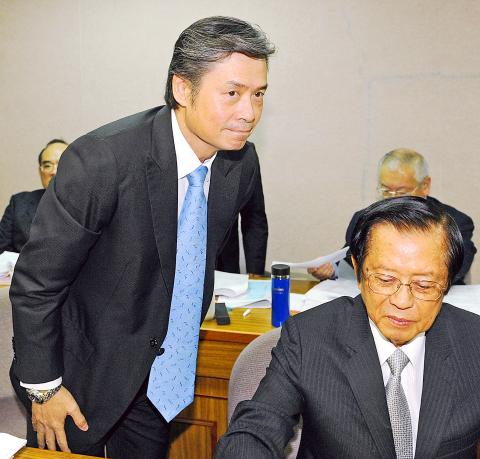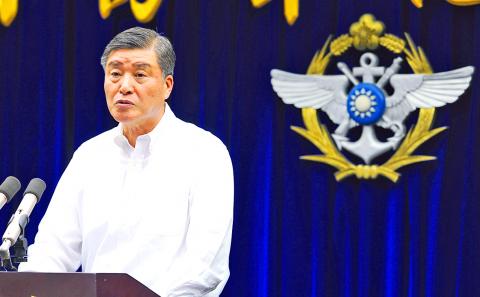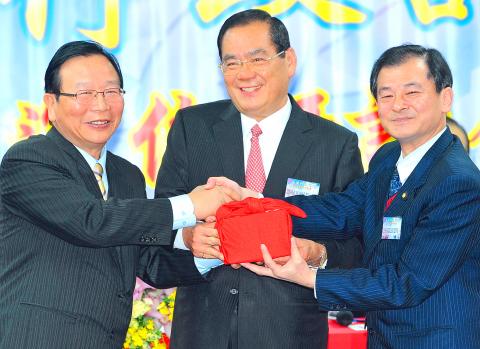The Presidential Office yesterday said it has approved the resignations of National Security Council Secretary-General King Pu-tsung (金溥聰) and Presidential Office Secretary-General Timothy Yang (楊進添), despite President Ma Ying-jeou (馬英九) repeatedly calling for the two officials to remain in their posts.
King is to be succeeded by former minister of national defense Kao Hua-chu (高華柱) and Yang by former deputy legislative speaker Tseng Yung-chuan (曾永權). The new appointments are set to take effect on Thursday next week.
The Presidential Office said that Yang tendered his resignation several days ago on the grounds that his mission had been completed, and, after being asked to remain by the president, resubmitted his resignation citing the need to take care of his elderly mother.

Photo: Chen Chih-chu, Taipei Times
Yang’s second attempt to resign was approved, and, in accordance with precedent, he is to be hired as a senior adviser to the president, the Presidential Office said.
King resigned for “personal health and family reasons” and was also asked not to leave by the president several times, according to the Presidential Office.
King reportedly underwent a coronary artery stenting procedure in October last year.

Photo: Luo Pei-teh, Taipei Times
A source told CNA that King had another heart operation last week, and his family has insisted that he leave his post due to the workload and pressure.
According to a CNA report, King is not expected to work in the near future.
Democratic Progressive Party Legislator Huang Wei-cher (黃偉哲) said he was surprised about the resignations, adding that Kao taking over the national security council was incomprehensible, as he previously resigned from his post as minister of national defense due to health concerns.

Photo: Wang Min-wei, Taipei Times
“The changes to power brought about by the shuffle between King and Kao are not easily understood. We hope that the Presidential Office would disclose more information regarding the arrangement so that the nation can have a clearer idea of what is going on,” Huang said.
Chinese Nationalist Party (KMT) Legislator Lin Yu-fang (林郁方) said King’s resignation also took him by surprise: “I seriously don’t know why [he resigned]; maybe he has other plans for his life.”
Meanwhile, Charles Chen (陳以信), previously deputy commissioner of the KMT's Culture and Communication Committee, is to replace Yin Wei (殷偉) as one of the Presidential Office's spokespersons, with the other being Ma Wei-kuo (馬瑋國). Yin will serve as the president's secretary, in charge of the president's speechwriting team.

INVESTIGATION: The case is the latest instance of a DPP figure being implicated in an espionage network accused of allegedly leaking information to Chinese intelligence Democratic Progressive Party (DPP) member Ho Jen-chieh (何仁傑) was detained and held incommunicado yesterday on suspicion of spying for China during his tenure as assistant to then-minister of foreign affairs Joseph Wu (吳釗燮). The Taipei District Prosecutors’ Office said Ho was implicated during its investigation into alleged spying activities by former Presidential Office consultant Wu Shang-yu (吳尚雨). Prosecutors said there is reason to believe Ho breached the National Security Act (國家安全法) by leaking classified Ministry of Foreign Affairs information to Chinese intelligence. Following interrogation, prosecutors petitioned the Taipei District Court to detain Ho, citing concerns over potential collusion or tampering of evidence. The

NEGOTIATIONS: Taiwan has good relations with Washington and the outlook for the negotiations looks promising, Minister of Economic Affairs J.W. Kuo said Taiwan’s GDP growth this year is expected to decrease by 0.43 to 1.61 percentage points due to the effects of US tariffs, National Development Council (NDC) Minister Paul Liu (劉鏡清) said at a meeting of the legislature’s Economics Committee in Taipei yesterday, citing a preliminary estimate by a private research institution. Taiwan’s economy would be significantly affected by the 32 percent “reciprocal” tariffs slapped by the US, which took effect yesterday, Liu said, adding that GDP growth could fall below 3 percent and potentially even dip below 2 percent to 1.53 percent this year. The council has commissioned another institution

NEGOTIATIONS: The US response to the countermeasures and plans Taiwan presented has been positive, including boosting procurement and investment, the president said Taiwan is included in the first group for trade negotiations with the US, President William Lai (賴清德) said yesterday, as he seeks to shield Taiwanese exporters from a 32 percent tariff. In Washington, US Trade Representative Jamieson Greer said in an interview on Fox News on Thursday that he would speak to his Taiwanese and Israeli counterparts yesterday about tariffs after holding a long discussion with the Vietnamese earlier. US President Donald Trump on Wednesday postponed punishing levies on multiple trade partners, including Taiwan, for three months after trillions of US dollars were wiped off global markets. He has maintained a 10 percent

TRADE: The premier pledged safeguards on ‘Made in Taiwan’ labeling, anti-dumping measures and stricter export controls to strengthen its position in trade talks Products labeled “made in Taiwan” must be genuinely made in Taiwan, Premier Cho Jung-tai (卓榮泰) said yesterday, vowing to enforce strict safeguards against “origin laundering” and initiate anti-dumping investigations to prevent China dumping its products in Taiwan. Cho made the remarks in a discussion session with representatives from industries in Kaohsiung. In response to the US government’s recent announcement of “reciprocal” tariffs on its trading partners, President William Lai (賴清德) and Cho last week began a series of consultations with industry leaders nationwide to gather feedback and address concerns. Taiwanese and US officials held a videoconference on Friday evening to discuss the